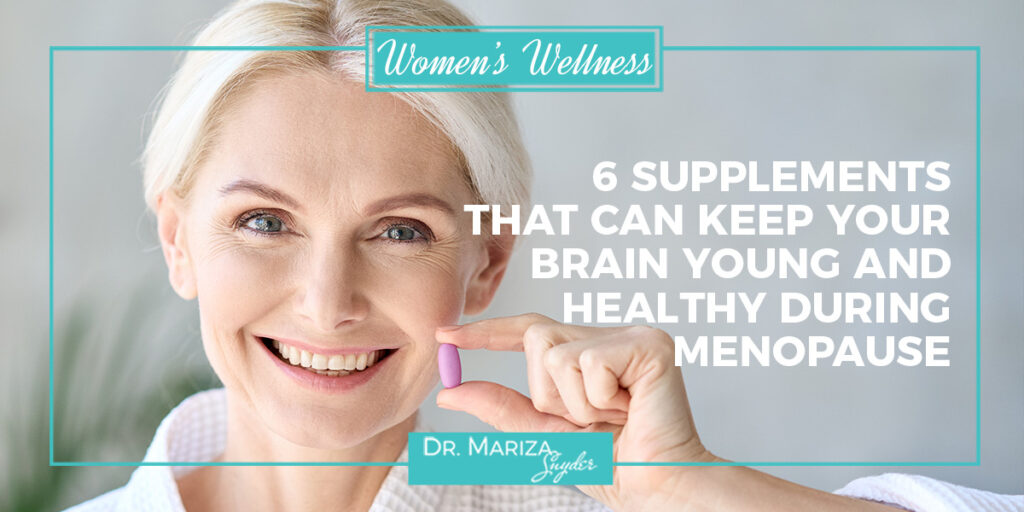
WHY TAKE SUPPLEMENTS FOR YOUR BRAIN DURING MENOPAUSE?
If you’re dealing with unbalanced hormones, hot flashes, chronic fatigue, mood swings, or other physical symptoms of a health issue, you’re not alone.
You may feel like your brain health is low on the priority list while you’re dealing with more immediate and severe symptoms. However, taking care of your cognitive health is crucial to keeping you feeling your best and solving any menopause-related issues.
WHY IT’S CRUCIAL TO GIVE YOUR BRAIN EXTRA SUPPORT DURING MENOPAUSE
Your brain is responsible for keeping your lungs breathing, your heart beating, and ensuring you’re alive — all without you having to give it a single thought.
As you get older, you want to ensure your brain is still in top shape.
Studies show that memory and cognitive decline can start around midlife, or around your 50s. (1) However, for most people, it starts around your 70s.
Multiple studies have shown the importance of estrogen in protecting your hippocampus, the part of your brain that protects you from aging. (2)
A study in The Malaysian Journal of Medical Sciences notes links between estrogen receptors and the “hippocampal formation (HF), the amygdala and the cerebral cortex” in the brain. The study states: “These three regions are responsible for the critical functioning of emotions, memory consolidation, and retrieval, and cognitive processes in general.” (2)
As you hit pre-menopause and menopause, your ovaries stop producing estrogen — and your levels drop. (3) This can affect your body in more ways than you imagine — including your brain.
HOW SUPPLEMENTS CAN HELP YOUR BRAIN HEALTH IN MENOPAUSE
With hormones — estrogen in particular — playing a crucial role in your brain health, it’s vital to ensure you’re getting your body the nutritional support it needs to keep your cognitive function high.
As is the case with vitamin D and so many other key nutrients, even if you’re eating a well-balanced diet and taking good care of your overall health, it can be difficult to ensure you’re getting the right amount.
Especially if you’re dealing with hormone imbalances, you’re battling fatigue, and feeling otherwise poorly, your body may burn through those key nutrients even quicker — and you’re left deficient. This can lead to even worsened symptoms and make you feel like no matter what you do, your body can’t get back into balance.
Supplements are key to ensuring your brain — and the rest of your body — gets the crucial nutritional support it needs.
With the right complete supplement, you can give your brain the vitamins and nutrients it needs to keep your memory and cognitive health high.
WHAT SUPPLEMENTS CAN HELP YOUR BRAIN STAY SHARP?
There are some amazing benefits of different ingredients that can help your brain.
ACETYL-L-CARNITINE
Acetyl-L-Carnitine can help your brain continue to communicate efficiently and quickly as you get older. (4)
Supplements with Acetyl-L-Carnitine have also been linked with improved focus and a greater ability to keep, store, and retrieve both short- and long-term memories, making it a great natural tool to boost memory and overall cognitive function. (5)
CITICOLINE
Citicoline has a robust history for individuals with a wide variety of brain health needs. It helps maintain healthy circulation in your brain, enabling you to think more clearly and have a stronger memory as you get older! (6)
COFFEE FRUIT CONCENTRATE
Evidence shows coffee cherry extract helps support the brain with: (7)
- Faster reaction times
- Increased attention
- Longer sustained focus
Whole coffee fruit concentrate powder has also been found to help certain brain conditions related to proteins that help make memories. (8) (9) (10)
PHOSPHATIDYLSERINE
Research shows that phosphatidylserine — which occurs naturally in small amounts in foods like organic soy, organ meat, white beans, and egg yolks — can:
- Improve cognitive strength and focus (11)
- Help hormone release by supporting the body’s natural circadian rhythms
- Help the brain’s hypothalamic-pituitary-adrenal (HPA) axis, which is essential for regulating your body’s stress, sleep, hormones, and other essential systems. (12) (13)
GINKGO
Touted as a “brain herb,” ginkgo has been praised for: (14)
- Its potential to help people’s memories stay sharp
- Improving blood circulation in your brain
- Fighting free radicals that may potentially contribute to Alzheimer’s, heart disease, and more
- Potentially protecting nerves that may be damaged by Alzheimer’s
L-ALPHA-GLYCERYLPHOSPHORYLCHOLINE
L-Alpha-Glycerylphosphorycholine increases brain processes that help regulate the involuntary nervous system like muscle contractions, heart rate, and blood vessel health. (15) (16) Your brain’s health dictates how your WHOLE body works, so this is such an essential part of staying healthy!
Research also shows that Alpha-GPC helps learning and memory. (15)
Ready for a complete supplement that contains all these brain-supporting ingredients in one place? Grab Neuro+ Support here! >>
WHAT ELSE CAN YOU DO TO PROTECT YOUR BRAIN?
In addition to giving your body proper nutritional support, there are some other steps you can take to protect your brain:
EXERCISE
We all know about the physical benefits of regular exercise — but did you know it can boost your brain health, too?
Studies show that physical exercise can help people’s memory, thinking, and cognitive function. (17)
MENTAL EXERCISE
Mental exercises may help promote the growth of new brain cells. This can help decrease the chances of developing dementia. (18) Mental exercises also may help overall brain function.
SOCIAL RELATIONSHIPS
Being social not only feels good because you get to be around those you love — but it also comes with brain health benefits. (17)
Research shows that communicating with others helps challenge your mind. When you socialize, your brain has to work to interpret both verbal and visual cues. Then, your brain has to help you respond to those cues — which helps keep your cognitive function up.
BRAIN FOOD
A healthy diet can be one of the most crucial factors in supporting brain health.
Eating well-balanced meals — in proper amounts (not too much, and not too little) — plays a crucial role in your brain health. (19)
Foods with lots of antioxidants can fight off harmful free radicals. (18) Some foods high in antioxidants to incorporate into your diet include: (20)
- Dark, leafy greens
- Fruit: Sweet cherries, wild blueberries, cranberries, raspberries, strawberries
- Russet potatoes
- Red kidney beans
- Artichokes
- Pecans
STABILIZING BLOOD SUGAR
One study linked lower blood sugar levels with better brain health and a lower risk of cognitive decline, Alzheimer’s, and Dementia. (21)
High blood sugar has also been linked with inflammation, which can slow brain signal transmission speed and impact endurance. (22)
Curious about how blood sugar can impact your hormone health and more? Check out the podcast episode that covers it all here >>
SUPPORT YOUR BRAIN DURING MENOPAUSE WITH NEURO+ SUPPORT
Remember, your health starts from the inside out — and ensuring your brain can keep your body processes running as they should help you feel your absolute best.
If you’re ready to give your brain the essential support it needs to help you avoid brain fog, keep a sharp memory, and feel your best, grab Neuro+ Support today!
It’s the complete supplement for your brain health, with Ginkgo, coffee fruit concentrate, L-Alpha-Glycerylphosphorycholine, phosphatidylserine, and more.
External Sources:
- https://www.ncbi.nlm.nih.gov/pmc/articles/PMC2683339/#:~:text=%E2%80%9CCognitive%20decline%20may%20begin%20after,Albert%20%26%20Heaton%2C%201988).
- https://www.ncbi.nlm.nih.gov/pmc/articles/PMC6422548/
- https://my.clevelandclinic.org/health/diseases/21837-postmenopause#:~:text=Decreased%20estrogen%20levels%20cause%20the,any%20discomfort%20caused%20by%20sex.
- https://onlinelibrary.wiley.com/doi/full/10.1111/j.1447-0594.2010.00595.x
- https://clinmedjournals.org/articles/ijnn/international-journal-of-neurology-and-neurotherapy-ijnn-6-089.php
- https://www.ncbi.nlm.nih.gov/pmc/articles/PMC2695184/
- https://www.ncbi.nlm.nih.gov/pmc/articles/PMC7909261/
- https://pubmed.ncbi.nlm.nih.gov/23312069/
- https://medlineplus.gov/genetics/gene/bdnf/
- https://qbi.uq.edu.au/brain-basics/brain/brain-physiology/what-synaptic-plasticity
- https://www.mayoclinic.org/diseases-conditions/alzheimers-disease/expert-answers/phosphatidylserine/faq-20057764
- https://www.nanotechnologystore.com/(9)-Phosphatidylserine-Membrane-Nutrient-for-Memory.pdf
- https://pubmed.ncbi.nlm.nih.gov/30428949/#:~:text=The%20hypothalamic%2Dpituitary%2Dadrenal%20axis,origins%20of%20health%20and%20disease.
- https://www.mountsinai.org/health-library/herb/ginkgo-biloba
- https://www.ncbi.nlm.nih.gov/pmc/articles/PMC4595381/
- https://www.britannica.com/science/acetylcholine
- https://health.clevelandclinic.org/why-exercise-protects-your-brains-health-and-what-kind-is-best/#:~:text=Research%20suggests%20that%20engaging%20in,changes%20before%20you%20exhibit%20symptoms.&text=%E2%80%9CWe%20think%20these%20new%20skills,brain%20areas%2C%E2%80%9D%20he%20adds.
- https://healthybrains.org/pillars/
- https://www.health.harvard.edu/mind-and-mood/a-workout-for-your-brain
- https://www.stjohns.health/documents/content/top-20-foods-high-in-antioxidants.pdf
- https://dom-pubs.onlinelibrary.wiley.com/doi/10.1111/dom.14321
- https://teamhealthcareclinic.com/brain-inflammation-sugar-surprising-connection/


No comments yet.